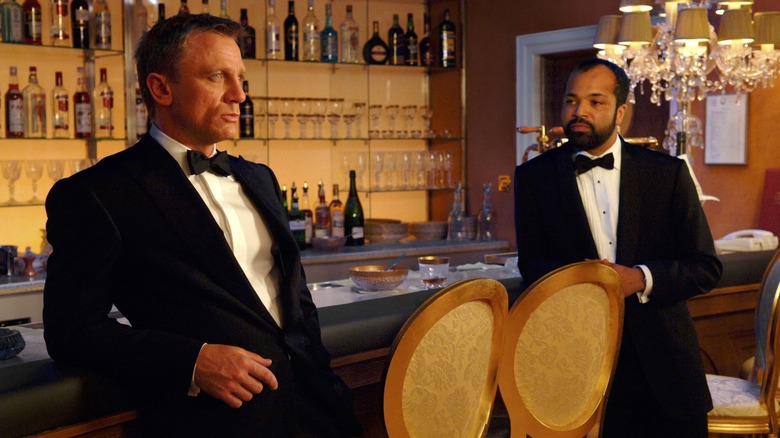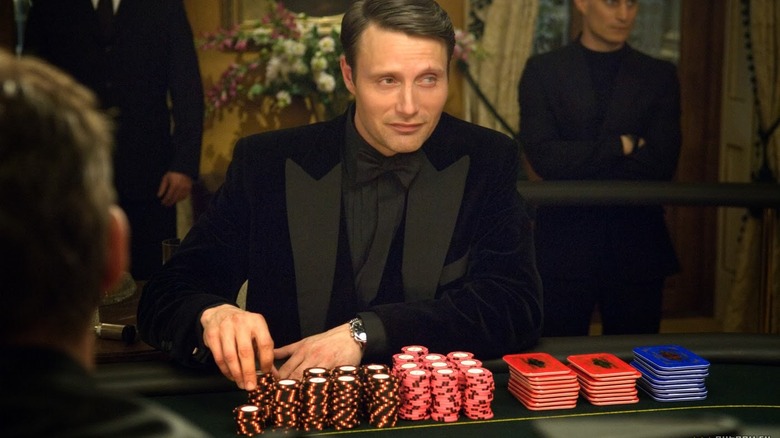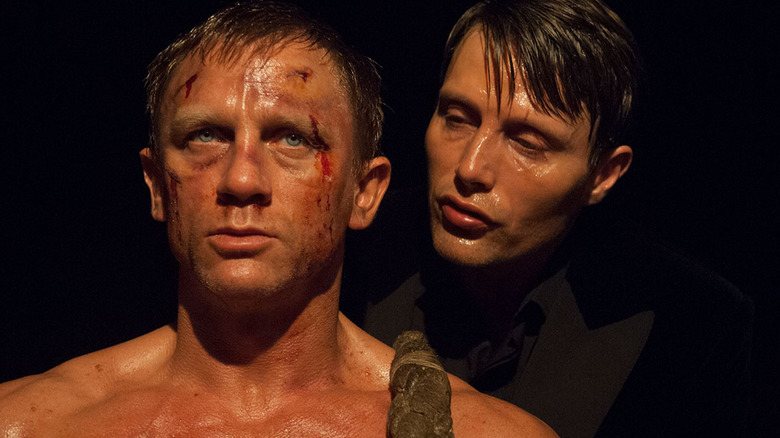Daniel Craig's Casino Royale Scrapped A Major Part Of Its Source Material
Ian Fleming's first James Bond novel, "Casino Royale" was published on August 13, 1953. He arrived just in time. In Tony Bennett's and Janet Woollacott's 1987 book "Bond and Beyond: The Political Career of a Popular Hero," the authors point out that Bond's literary function was to lend England — smarting after the damage of the second World War, and currently embroiled in a Cold War — a little bit of patriotic panache. James Bond was a tough, get-the-job-done jet-setter who, over the course of his first novel, manages to out-gamble the wicked Le Chiffre, a member of the Russian secret service. It's a simple story, but an exciting one.
"Casino Royale" was adapted to American television in 1954 as part of the anthology series "Climax!" In that version, Barry Nelson played James Bond, now American, against Peter Lorre's Le Chiffre. James Bond would infiltrate movie theaters in 1962 with "Dr. No" starring Sean Connery, kicking off a lucrative film franchise that persists to this day (or at least until the release of 2021's "No Time to Die"). The title of "Casino Royale" would also be borrowed for a high-octane super-spoof in 1967, proving that the James Bond spy formula was outwardly risible only 14 years after the character's introduction.
In 2006, director Martin Campbell rebooted the James Bond film series with his own rendition of "Casino Royale," a film in which James Bond was aged down and just entering the spy business. Bond was played by Daniel Craig. And a major part of the original novel was changed.
Poker or baccarat?
The 2006 film is a more-or-less accurate adaptation Fleming's 1953 novel. The movie ratchets up the action, of course — there are no parkour demonstrations in the novel — and expands the story to provide a wider variety of chases and escapes, but the basic story remains intact. James Bond must, as a newly appointed MI6 agent, travel to a posh casino in Montenegro (in the book, the fictional French town of Royale-les-Eaux) and play cards with Le Chiffre (Mads Mikkelsen). Bond is aided by a team of international helpers. In the book, Bond and Le Chiffre play baccarat. As baccarat is not terribly well known to a modern audience, director Campbell decided that the game should be changed to poker. It's a small change that allows a broader audience to follow along more carefully.
In a 2012 interview with IGN, Campbell also talked about how "Casino Royale" had to remove all references to particular Cold War entities that have long since ceased to exist. Campbell had to delete SMERSH. But that was all. He said:
"The only thing you can't use from the book — I don't know how many of you have read it — it was written in 1953 [and] was set against the Cold War. In fact, it was the first one that involves SMERSH, and we've obviously had to change that. But, essentially the book remains pretty much in tact. The whole game takes place. Le Chiffre is the bad guy, who was the bad guy there."
SMERSH no more
SMERSH was the catch-all term for multiple Soviet spy agencies that was established during the height of World War II as an effort to fight the Nazis on the Western Front. It should be immediately noted that Ian Fleming's version of SMERSH is wildly inaccurate, and he likely used the name as a general descriptor for any and all Russian spy malfeasance. In later novels — and later James Bond movies — SMERSH would be replaced by the fictional supervillain society SPECTRE (Special Executive for Counterintelligence, Terrorism, Revenge, and Extortion).
Almost everything else in the book did end up appearing in Campbell's movie, including the scene where Bond is strapped to a chair naked and tortured by Le Chiffre:
"Your genital whacking scene, whomever came up with that, that all remains. So, it's pretty much the last two thirds of the movie will be like the book. And Bond will fall in love with Vesper Lynd, as he does in the book. He's just got his 007 stripes when he gets into the story so he's got some rough edges on him to begin with and hopefully, by the end of it, he'll become the 007 we all know and love."
One thing that was removed from the movie was that Le Chiffre carved a Russian letter – Ш, the first letter of the Russian word for "spy" — into the back of Bond's hand. That doesn't happen in the movie.
As of this writing, Campbell's "Casino Royale" is still considered to be one of the best Bond movies. It's a gritty Bond film for a post-9/11 world. The next film, in updating Bond to match the current world's politic, will — this author predicts — likely supplant it. I'm betting on it, like Bond would.


